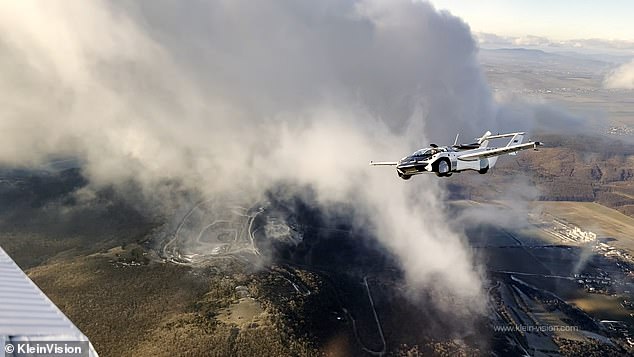<!–
<!–
<!– <!–
<!–
<!–
<!–
From Harry Potter to The Jetsons, flying cars have been staples of sci-fi blockbusters for years.
But little by little they are becoming a reality, and several companies are competing to be the first to launch a commercially available vehicle.
One such company is KleinVision, the Slovakia-based developer of AirCar, the “world’s first certified flying car” that can transform from a road vehicle to an airplane in less than three minutes.
While the car is already certified to fly in Slovakia, the technology behind it has now been sold to a Chinese company that KleinVision says will “accelerate progress toward mass-market flying cars.”
The news comes shortly after the UK government announced that flying taxis will be flying in British skies by 2028.

Flying cars are slowly but surely becoming a reality, with several companies competing to be the first to launch a commercially available vehicle. One such company is KleinVision, the Slovakia-based developer of AirCar.
AirCar is a dual-mode craft, which can reach heights of more than 8,000 feet and speeds of more than 100 mph.
It became certified to fly in Slovakia in 2022 after completing more than 200 takeoffs and landings during 70 hours of rigorous flight testing to European Aviation Safety Agency (EASA) standards.
Now, the technology has been sold to Hebei Jianxin Flying Car Technology Company for an undisclosed amount.
This licensing agreement gives the Chinese company exclusive rights to manufacture and distribute flying cars using KleinVision’s technology within a “specific”, as yet undisclosed, geographic region.
“This partnership represents a significant step in our mission to expand global access to revolutionary mobility solutions and drive progress in the industry,” said Anton Zajac, co-founder of KleinVision.
Hebei Jianxin Flying Car Technology Company is based in Cangzhou and has already built its own airport and flight school.


AirCar is a dual-mode craft and can reach heights of over 8,000 feet and speeds of over 100 mph.


It became certified to fly in Slovakia in 2022 after completing more than 200 takeoffs and landings during 70 hours of rigorous flight testing to European Aviation Safety Agency (EASA) standards.
And the ability to use KleinVision’s technology could help the company get ahead of its rivals.
According to Morgan Stanley, the global flying car market is expected to reach $1 trillion by 2040, before jumping to a whopping $9 trillion by 2050.
China is on track to own 23 percent of the market by 2050, second only to the United States’ 27 percent.
speaking to NikkeiGuo Liang, CEO of Chinese flying car developer Aerofucia, said the flying car revolution in China “will surpass the electrification of automobiles.”
“Full commercialization of flying cars in China will begin in 2025 or 2026,” Guo said.
While the price of flying cars remains unclear, Guo says they will quickly become more affordable than helicopters.
“As a new mode of low-altitude transportation, the fares (of flying cars) will initially be one-third or one-fifth of those of helicopters,” Guo said.
“It may be a little expensive for ordinary people, but costs will continue to go down.”


While the price of flying cars is still unclear, Guo says they will quickly become more affordable than helicopters.
